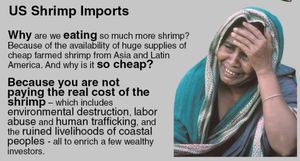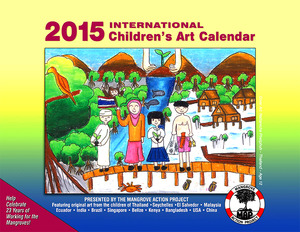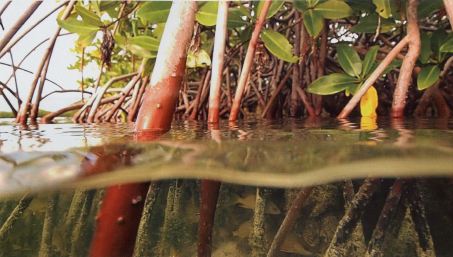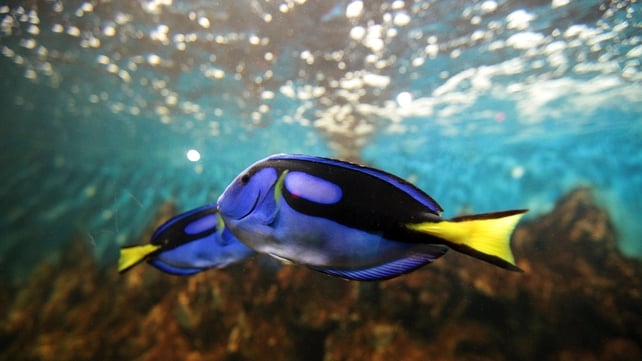Action Alerts: Development Coordinator Wanted
MAP is seeking a creative, energetic, and environmentally aware development coordinator to support administrative work and the QYS campaign in Seattle, Washington. READ MORE FREE MAP Mangrove e-cards CLICK HERE

MAP’s e-Cards offer you a unique way to spread the work about MAP’s good works, while sharing beautiful photographs of the mangroves Mexican Everglades Threatened
A great threat looms over EVERGLADES NATIONAL largest mangrove area in the Mexican Pacific due to the interest of building the project: Canal Centenary and hydroelectric Las Cruces, in the state of Nayarit. Please spread this open letter to the President of the Mexican United States where we request the cancellation of the project. READ MORE
EN ESPANOL Information sheds clear light on shrimp-mangrove connection

SEE DETAILS MANGROVE/SHRIMP CBEMR work on Klang Island, Krabi is Finally Underway – MORE INFO CALLING FOR MANGROVE ART SUBMISSIONS!
A fun and exciting Art Contest for children 6 to 16 years old. We invite all primary school children from tropical and sub-tropical nations, and whose schools are located near mangroves, to create art telling us “why mangroves are important to my community and me?”. Selected winners will be published in a 2016 calendar to be distributed internationally to raise awareness of mangrove forest ecology. READ MORE SHARE MAP'S VISION
CLICK HERE to watch short introductory video. Together we can work "at the roots of the sea". Join us in saving our beautiful country!
We hope you have been following the ongoing battle in Bimini, Bahamas.
We are in need of your help more than ever Click here
Exclusive Interview with Alfredo Quarto, Co-Founder and Executive Director of Mangrove Action Project – See more
MAP VOLUNTEERS NEEDED IN THAILAND VIEW REQUIREMENTS
Order your 2015 Calendar

1-20 calendars, $12 each plus shipping
21-49 calendars, $10 ea plus shipping
50-100 calendars, $8 each plus shipping.
Over 100 $7 each plus shipping
Question Your Shrimp- Don't Buy or Sell Imported Tropical Shrimp! Sign the Petition Donate to MAP via Paypal
Giving could never be easier  It’s the action, not the fruit of the action, that's important. You have to do the right thing. It may not be in your power, may not be in your time, that there'll be any fruit. But that doesn't mean you stop doing the right thing. You may never know what results come from your action. But if you do nothing, there will be no result. —Mahatma Gandhi It’s the action, not the fruit of the action, that's important. You have to do the right thing. It may not be in your power, may not be in your time, that there'll be any fruit. But that doesn't mean you stop doing the right thing. You may never know what results come from your action. But if you do nothing, there will be no result. —Mahatma Gandhi Green Planet Fundraising Assists MAP – LEARN MORE
MANGROVE ISSUES View New Videos posted by MAP Asia intern, Delphine. CLICK HERE
The importance of restoring mangroves in an effective, long-term manner. Mangrove video – VIEWPlease view our new video for our Question Your Shrimp Consumer/Markets Campaign! It is now on our website under the Question Your Shrimp section heading. WATCH VIDEO Mangrove Restoration in Asia – Watch Short Video

READ A MOSAIC OF LIFE” Peek into the underwater world of mangroves, "womb of the sea." By Liz Cunningham Photos By Wes Matweyew and Liz Cunningham View MAP’s uploaded Videos at MAPmangrover’sChannel “Education In The Mangroves" can now be seen on the PhotoPhilanthropy website here! Marvellous Mangroves – A Curriculum-Based Teachers Guide.
By Martin A. Keeley, Education Director, Mangrove Action Project
Read this 10 page history of the development of MAP’s educational curriculum VIEW DOCUMENT FOR MORE ON MAPs AWARD WINNING CHINA MANGROVE CURRICULUM VISIT THESE SIGHTS
SLIDE SHOW VIMEO SHOW Education In The Mangroves
Six minute video features discussion of Mangrove Action Project’s Mangrove Curriculum VIEW THE VIDEO
Article in Canada's Green Teacher Magazine – Read More
"Question Your Shrimp" Campaign Learn more about the affects of the shrimp industry on mangroves by visiting our blog Editor’s Note: Mangrove Action Project’s Executive Director, Alfredo Quarto was interviewed about shrimp by Green Acre Radio’s Martha Baskin LISTEN TO INTERVIEW
Join MAP on Facebook
Sign the Consumer's Pledge to avoid imported shrimp

Not yet a MAP News subscriber?
Click here to subscribe.
Note to Our Readers:
We strive to keep active links in our newsletter. However, due to circumstances beyond our control, occasionally links to stories may become broken. If you find a link to a story is not functioning, please cut and paste the headline into your browser search bar. In most cases you should be able to locate the original story.
Help Mangrove Action Project through your recycled E-Waste. List of Accepted E-waste Items: Injet Cartidges, Cell Phones, Pagers, GPS, Radar Detectors, Mobile Hot Spots, Calculators, eBook Readers, iPods/MP3 players, Digital/Video Cameras/Camcorders, PDAs, iPads/Tablets/Laptops, Video Game Consoles, Handheld Video Games Visit the Mangrove Action Project recycle website Click on the recycle button then click on the Download Shipping Label, and follow the instructions. 
| FEATURED STORYEditor's Note: The present Honduran president was installed in office by the Honduran military after a coupe removed the democratically elected president from offiice two years ago. FAO Guidelines and Fisheries Act JOH 
After 6 years of discussions among global networks of organized fishers civil society from all continents and all 139 member states that make up the FAO, the "Guidelines" were approved by FAO in June 2014 to ensure the sustainability of artisanal fisheries small scale in the context of food sovereignty, the eradication of poverty and respect human rights. These "Guidelines" are addressed to the Member States of FAO, as is Honduras. Recognize the importance of artisanal fisheries in food. Seek to contribute to sustainable development of fishing communities through fisheries management and conservation of water resources, based on principles of respect for human rights, cultures, consultation and participation, transparency, accountability, sustainability biosocioeconómica, etc. And for achieving responsible fisheries to provide food for millions of inhabitants of the planet, within a framework of sustainable development, provide: responsible governance of tenure; sustainable management of resources; social development, employment and decent work; support value chains; gender equality; disaster risk and climate change. In them, the States agree to consider the development and implementation of policies, strategies and legal frameworks participatory and respectful … and boost the economy of artisanal fishing communities and improve nutrition in the world. READ MORE
ASIA Environmental Education and Research Center on MSN Island

MYANMAR – The Mangrove Service Network (MSN) as part of its long term ambitious plan of enhancing environmental conservation, increasing knowledge on mangroves and their environment, and promoting alternative sources of income for the rural population of the Ayeyarwaddy Delta, has established a Mangrove Environment Education and Research Centre on a 50 acre island in Bogalay Township, with initial funding from Australian-Aid (Direct Aid Program 2012-13)" Mangrove and forest areas are degrading at a tremendous rate due to over extraction mostly caused by lack of awareness of the rural communities. The cyclone Nargis in 2008 has shown the importance of such areas as natural buffer against the ever more frequent hazards impacting the Delta area. The importance in preserving and documenting such natural areas as well as promoting the sustainable use of natural resources by rural communities has been identified as a critical issue.Currently, MSN is utilizing the Environmental Education and Research Centre on their own island funded by the Australian Embassy. READ MORE Villagers continue digging at the CBEMR site #1
THAILAND – On October 7th, MAP staff member, Jaruwan Enright (Ning), visited the CBEMR site #1 at Village No. 3, Klong Gam in Krabi. The eight villagers from Klong Prasong’s village number 1 and another six helpers from village number 2 on Koh Klang were working together with Mr. Somphot Nimsuntijaroen, a fishery adviser for MAP. The group was grading the slope along the bank of the pond so the mangrove seedlings would have more space to settle and grow. Additionally, they worked on fixing the sluice gate to make sure that the hydrology inside the pond would flow naturally. With the help from Project Abroad, an international volunteer overseas program with a marine and coastal project based in Krabi, and more than a few local community members, work continued on the hydrology restoration of an abandoned pond on Klang Island in the Krabi River estuary. The combined efforts of the multi-national team using shovels and broad hoes effectively continued the work of digging canals through the center of the pond for tidal water access without the use of heavy machinery. READ MORE Its not just about the environment anymore
VIETNAM – Attendees, media and likely many of the speakers at last week’s Global Outlook for Aquaculture Leadership (GOAL) conference in Ho Chi Minh City, Vietnam, must have been somewhat surprised that so much time and energy was spent on social issues as opposed to the environmental impacts of fish farming alone. The two, however, are now permanently intertwined. (Food safety would be the “third leg of the stool” of a global seafood procurement policy, if metaphors are your thing.) It reflects positively on the industry, and the entire seafood supply chain for that matter, that a large percentage of the discourse at the global gathering was devoted to human rights and responsible treatment of workers on fishing vessels, on farms and in processing plants. Even if certain phrases were repeated ad infinitum or sounded straight out of the attorney playbook, nobody was ducking the issue. They simply can’t afford to. If ignorance is forgivable, avoidance is not. READ MORE EDITORS NOTE This news article is very positive and progressive news highlighting DMCR's plans to reclaim 48,000 ha of encroached mangroves, turning half over to local community management. This shows they recognize the importance of community involvement in mangrove restoration, management and protection. But it remains to be seen how effective DMCR will actually be considering the complicated land tenure issues and the slow process of the courts Also the fact that DMCR was not able to prevent the encroachment from occurring in the first place and that half the remaining mangrove is degraded is not encouraging. Let's hope they will succeed in this ambitious plan to reclaim mangrove habitat, while preventing further encroachment into the mangroves.
Marine department to reclaim forest areas
THAILAND – The Marine and Coastal Resources Department plans to reclaim possession of at least 300,000 rai of encroached mangrove forest areas nationwide within the next five years. The department's plan willbe in line with the National Council for Peace and Order's (NCPO) policy to deal with land encroachment problems. Under the same policy, the NCPO hopes to provide the rights to administering mangrove forest areas to communities close by so they can help preserve the mangrove forests. Department director-general Chonlatid Suraswadi said his department plans to regain possession of at least 300,000 rai of mangrove forest areas nationwide from those encroaching on them. Deteriorated mangrove areas can be found in many provinces. He said he will propose the plan immediately after new Natural Resources and Environment Minister Gen Dapong Ratanasuwan officially takes up his position at the ministry. READ MORE Swimming Camels of Kachchh at Risk

INDIA – The Kharai of Kachchh district in Gujarat, India, is possibly the only camel breed that can survive in both land and marine ecosystems. It feeds on mostly plants grown in saline land, swimming up to three kilometers out to small islands within the mangroves during monsoon season. But its habitat is at risk. A decline in grazing resources has led to a decline in camel population. Only 2,173 camels in Kachchh district are the Kharai breed, and they are managed by only 72 camel breeders. The camel pastoralists of Kachchh, which also raise an inland breed called the Kachchh, are calling for recognition of their national and international rights that have been ignored. According to new community protocol written with help from the Christensen Fund, “Our nomadic or semi-nomadic lifestyles lead to our frequent marginalization or outright exclusion from the policy process. However, we are committed to the conservation of our land, its associated biodiversity, and our livelihood.” READ MORE AMERICAS Climate change causing fish to disappear from tropics

CANADA – Large numbers of fish will disappear from the tropics by 2050 due to climate change, scientists have warned. More fish will be driven into Arctic and Antarctic waters, according to experts who examined the impact of the seas warming up on fish stocks. In the worst-case scenario, where the Earth's oceans warm by three degrees Celsius (5.4F) by 2100, fish could move away from their current habitats at a rate of 26 kilometres per decade. The best-case scenario, where the Earth warms by one degree Celsius (1.8F) – fish would move 15 kilometres every decade, researchers at The University of British Columbia (UBC) said. They added that this is consistent with changes in the last few decades. The UBC study also identified ocean hotspots for local fish extinction. READ MORE OCEANIA Mangrove ID App available for iPhone, iPad & Android

Dr. Norman Duke from the TropWATER Centre at James Cook University in Australia has developed a mangrove ID application for smart phones. The ŒWorld Mangrove iD‚ app for iPhone, iPad and Android devices is an e-book, and a living expert guide to all mangrove plants worldwide. Do you have an interest in the fascinating world of mangroves? Do you have questions like: What mangrove is that?; or What mangroves grow in my country? Maybe also, Why are mangroves important? You will find answers, and more, in the World Mangrove iD e-book app. The guide provides more than 800 exquisite images, 100 world distribution records and authoritative botanical descriptions of all 85 mangrove plant species, hybrids and varieties occurring worldwide; plus a selection of 15 common Associate plants you are likely to come across. The information and data presented provides the very latest up-to-date botanical information from Dr Duke's Mangrove Flora Project conducted over the last three decades. The app is about $10 USD which is a very great valuable for such a wealth of information. iD Mangrove App information on Mangrove Watch:
For iPhone & iPad get Mangrove iD at iTunes:
For android smart phones get Mangrove iD at Google Play Store: LAST WORD(S)
NO MORE DEATHS IN OUR MANGROVES!
We now make public the attack that killed fellow Jeferson David Tejada, collector and artisanal fishermen of mangroves in the province of El Oro, who was savagely attacked by dangerous guard dogs who caused very serious injuries at dawn on Thursday October 16, 2014, resulting in his death, leaving his family in the orphanage. Jeferson, was harvesting shellfish when he was suddenly attacked by murderous dogs and guards of a nearby shrimp farm, probably part of the July Rimbaldo property, located on the island's Temples. We at C-CONDEM demand justice. 10 companions have now been killed by the shrimp industry in Ecuador, which now take refuge in Decree 1391 which illicitly authorizes them to be rightful owners of the mangroves and estuaries. We reiterate that the farm shrimp industry in Ecuador is illegal since it cut down 70% of the mangrove ecosystem and now moves to the communities, as murderous polluters of the mangroves, which are our life and our territory, economy and culture. We call on international organizations and urge the government and their competent authorities to put a stop to this series of abuses and systematic human rights violations, it is time to punish those responsible and ban immediately shrimp farms using electric fences, murderous dogs and the use of weapons that threaten human life. No more killings by the shrimp industry; we are gatherers and fisherfolk villagers and ancestral communities. We demand JUSTICE for the mangrove ecosystem and demand that the state protect our fundamental right to life.
NO MORE DEATHS IN OUR MANGROVES THAT ARE OUR TERRITORY OF LIFE.
C-CONDEM Statement-
Contacts: 0994893495 cel- Lider Gongora BACK TO TOP
Not yet a subscriber? Click here to subscribe. Please cut and paste these news alerts/ action alerts on to your own lists and contacts. Help us spread the word and further generate letters of concern, as this can make a big difference in helping to halt a wrongdoing or encourage correct action. |










